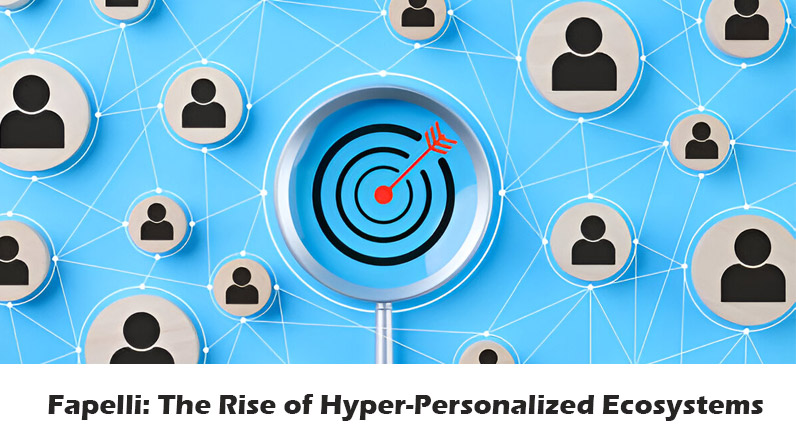In the ever-evolving digital landscape, the concept of fapelli is emerging as a powerful force, not just as a brand or a product, but as a paradigm shift in how we interact with online ecosystems.
Fapelli is increasingly associated with the creation of interactive, bespoke digital environments where users aren’t just consumers, but active participants. This evolution is driven by the demand for more meaningful online experiences, moving beyond the traditional transactional models to foster genuine community engagement.
The Shift Towards Hyper-Personalization
The digital era has been marked by a constant push for personalization. However, fapelli takes this concept to an entirely new level. It’s not just about recommending products based on past purchases or displaying targeted ads. It’s about building entire ecosystems that adapt and evolve based on individual preferences, behaviors, and interactions.
According to a study by Epsilon, 80% of consumers are more likely to make a purchase when brands offer personalized experiences. Fapelli leverages this by creating dynamic environments where every user interaction contributes to a more tailored and engaging experience. This is achieved through:
- AI-Driven Customization: Advanced algorithms analyze user data to dynamically adjust content, interfaces, and features.
- Behavioral Ecosystems: These systems learn from user behaviors, predicting needs and preferences, and proactively offering relevant solutions.
- Community Integration: Fapelli ecosystems seamlessly integrate community feedback and contributions, allowing users to shape the platform itself.
Fapelli and the Rise of Community Commerce
Community commerce is a model where transactions are driven by social connections and shared values. Fapelli is at the forefront of this movement, creating platforms where users can:
- Co-Create and Collaborate: Participate in the development of products, services, and experiences.
- Share and Recommend: Leverage social networks to discover and promote products and services.
- Engage in Value-Driven Transactions: Support brands and businesses that align with their personal values.
A real-life example of this can be seen in the rise of niche online communities focused on specific hobbies or interests. Fapelli platforms enhance these communities by providing tools for:
- Organizing virtual events and workshops.
- Facilitating peer-to-peer marketplaces for specialized goods.
- Creating collaborative content and knowledge repositories.
The Role of Data and Transparency in Fapelli Ecosystems
With hyper-personalization comes the need for robust data management. Fapelli emphasizes transparency and user control over data, building trust and fostering a sense of ownership.
Key aspects of data management in fapelli ecosystems include:
- User-Controlled Data Dashboards: Providing users with clear insights into how their data is being used.
- Opt-In Data Sharing: Ensuring users have full control over what data they share and with whom.
- Blockchain Integration: Utilizing blockchain technology to ensure data security and immutability.
The Impact on Various Industries
The fapelli paradigm has the potential to transform various industries:
- E-commerce: Moving from transactional to relational models, where customers become active participants in brand communities.
- Education: Creating personalized learning ecosystems that adapt to individual learning styles and needs.
- Healthcare: Developing patient-centric platforms that facilitate personalized care and community support.
- Entertainment: Building interactive entertainment experiences where users can shape the narrative and contribute to the content.
Fapelli Ecosystem Impact
| Industry | Traditional Model | Fapelli Ecosystem Model |
| E-commerce | Transactional, product-focused | Relational, community-driven, personalized experiences |
| Education | Standardized curriculum, passive learning | Personalized learning paths, interactive collaboration |
| Healthcare | Provider-centric, reactive care | Patient-centric, proactive care, community support |
| Entertainment | Passive consumption, linear narratives | Interactive experiences, user-generated content, co-creation |
Building a Fapelli Ecosystem: Key Considerations
For businesses and organizations looking to implement fapelli principles, several key considerations are crucial:
- User-Centric Design: Prioritize user needs and preferences in every aspect of the ecosystem.
- Community Engagement: Foster a sense of belonging and encourage active participation.
- Data Transparency: Build trust by providing users with control over their data.
- Technological Infrastructure: Invest in robust AI, data analytics, and blockchain technologies.
The Future of Fapelli
As technology continues to advance, fapelli will play an increasingly important role in shaping our digital interactions. The rise of virtual and augmented reality will further enhance the immersive and personalized nature of these ecosystems.
Fapelli is not just a trend; it’s a fundamental shift in how we experience the digital world. By prioritizing hyper-personalization, community engagement, and data transparency, fapelli is paving the way for a more meaningful and connected future.
FAQs
Q: What is a fapelli ecosystem?
A: A fapelli ecosystem is a hyper-personalized digital environment that adapts and evolves based on individual user preferences, behaviors, and interactions.
Q: How does fapelli promote community commerce?
A: Fapelli fosters community commerce by enabling users to co-create, collaborate, share, recommend, and engage in value-driven transactions within a shared online space.
Q: How does fapelli address data privacy concerns?
A: Fapelli emphasizes transparency and user control over data through features like user-controlled data dashboards, opt-in data sharing, and blockchain integration.
Q: What industries can benefit from implementing fapelli principles?
A: Industries that can benefit include e-commerce, education, healthcare, and entertainment.
Q: What are the key considerations for building a fapelli ecosystem?
A: Key considerations include user-centric design, community engagement, data transparency, and robust technological infrastructure.
Want more insights? Keep visiting Lotology for the latest updates and information!

